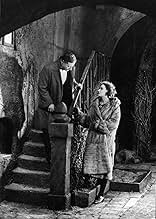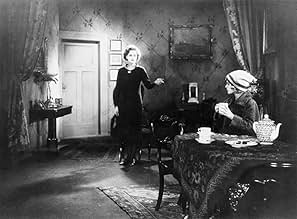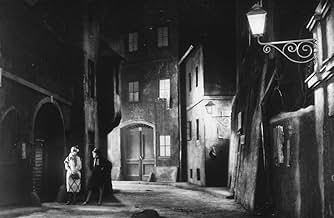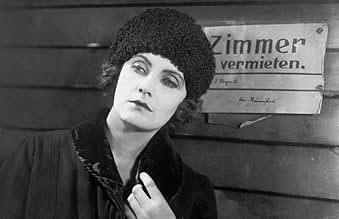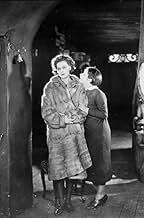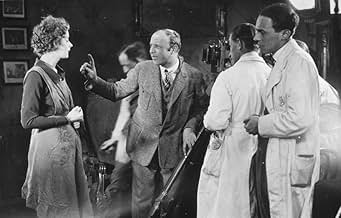VALUTAZIONE IMDb
7,0/10
1815
LA TUA VALUTAZIONE
Aggiungi una trama nella tua linguaIn post-WWI Vienna, Greta (Greta Garbo), her kid sister, and retired dad try to make it through tough times.In post-WWI Vienna, Greta (Greta Garbo), her kid sister, and retired dad try to make it through tough times.In post-WWI Vienna, Greta (Greta Garbo), her kid sister, and retired dad try to make it through tough times.
- Regia
- Sceneggiatura
- Star
Ágnes Eszterházy
- Regina Rosenow
- (as Agnes Esterhazy)
Dorothea Thiele
- Lia Leid
- (as Tamara)
Renate Brausewetter
- Frau
- (non citato nei titoli originali)
Mario Cusmich
- Oberst Irving
- (non citato nei titoli originali)
Maria Forescu
- Frau
- (non citato nei titoli originali)
Robert Garrison
- Don Alfonso Canez
- (non citato nei titoli originali)
Valeska Gert
- Frau Greifer
- (non citato nei titoli originali)
Max Kohlhase
- Marias Vater
- (non citato nei titoli originali)
Krafft-Raschig
- Amerikanische Soldat
- (non citato nei titoli originali)
Recensioni in evidenza
The interesting expressionist atmosphere and, most of all, a memorable performance by Greta Garbo (does she give any other kind?) both make "The Joyless Street" worthwhile. G.W. Pabst's style also makes a good combination with the setting in post-World War I Vienna. The supporting cast is also good, and all of this makes up for the lack of a first-class story.
Garbo is well-cast as the daughter who is the only real hope of an impoverished family trying to survive in a cold, unforgiving postwar city that is ruled by a handful of predatory exploiters. Just her eyes alone communicate volumes, and her character transcends the rest of the material. Pabst wisely included plenty of close-ups of Garbo, and these leave a lasting impression of her character's weary perseverance and strength of character.
Several of the other characters also have interesting stories of their own. There seem to be a number of different versions of the feature, with widely varying lengths, and thus with the story differently edited, so that some versions will work better than others. But regardless of the story, the setting is effectively rendered, and Garbo's performance stands out.
Garbo is well-cast as the daughter who is the only real hope of an impoverished family trying to survive in a cold, unforgiving postwar city that is ruled by a handful of predatory exploiters. Just her eyes alone communicate volumes, and her character transcends the rest of the material. Pabst wisely included plenty of close-ups of Garbo, and these leave a lasting impression of her character's weary perseverance and strength of character.
Several of the other characters also have interesting stories of their own. There seem to be a number of different versions of the feature, with widely varying lengths, and thus with the story differently edited, so that some versions will work better than others. But regardless of the story, the setting is effectively rendered, and Garbo's performance stands out.
I saw what appeared to be sourced from a UK reissue print of this film that only ran about an hour. I could tell, however, from what what not edited out of this print in order to emphasise the presence of Greta Garbo that it could not have been lightly that the decision was taken to distribute this film as "Joyless Street." It's relentlessly a relentlessly dispiriting tale of the poorer class being driven to misery, suffering, and humiliation at the whims of the rich. A theme like that can easily have a lot of political resonances, but "Joyless Street" prefers to take a more microcosmic tack and focus on the sorrows of one family and the events that lead to them.
It's a very well-made film; the filming, as might be expected, is highly atmospheric, and certain shots -- especially the roving camera down the line outside the butcher's -- are exquisite. It can't be said that Greta Garbo doesn't deserve the attention lavished on her by this edited print; she is absolutely magnetic. I haven't seen many with her kind of presence.
The addition of a serendipitous love story involving an American somehow doesn't cheer the film up significantly and seems a bit jarring and contrived.
It's a very well-made film; the filming, as might be expected, is highly atmospheric, and certain shots -- especially the roving camera down the line outside the butcher's -- are exquisite. It can't be said that Greta Garbo doesn't deserve the attention lavished on her by this edited print; she is absolutely magnetic. I haven't seen many with her kind of presence.
The addition of a serendipitous love story involving an American somehow doesn't cheer the film up significantly and seems a bit jarring and contrived.
1st watched 2/6/2007,61 minute edited version - 6 out of 10 (Dir-G.W. Pabst): Interesting silent drama that shows the major differences between upper-echelon and depression Austria after World War I and portrays it very well for the most part. The movie turns into a romantic piece in the last quarter which negates it's effectiveness but still shows us more than we normally see from this type of film. Greta Garbo plays in what is labeled as her first starring role in the version I watched, and does an admiral job as the daughter of a retired civil servant who's always trying to do the right thing to help her family's financial situation but it never seems to work out. Her performance is all about her facial and body gestures which, of course, is a must for a silent film and she is excellent with this. The hero in the film is an American do-gooder who helps the family survive by moving into their home and paying rent, but the authorities would prefer that he mingle with the uppity crowd and soon removes him from the setting. Everything works out in the end like a good Hollywood movie, which in my opinion takes away from the effectiveness of what could have been a more impressive piece of movie-making. ;watched app. 94 minutes version on 11/29/2015;added scenes and totally different non-romantic somewhat incomplete darker ending lend to a deeper film overall
Although suspiciously short (I have viewed the truncated American release, at about an hour and a half long) Pabst's dour film is still fascinating to watch.
Young Greta (Greta Garbo) contemplates prostituting herself to save her family from starvation during WW1 Vienna.
Although woefully incomplete, Pabst is well-served by the best European silents cast. Werner Krauss is on lascivious best-form as the avaracious butcher. The great Danish actress Asta Nielsen might be improbable casting as the daughter of a middle-aged couple (she was 44 at the time), but exudes sympathy. There is also a lovely cameo from Valeska Gert as the coat-shop assistant, who tempts Garbo into buying a fur coat after stroking her face and body with it.
It's all eyes on Garbo however, who gives a soulful, world-weary intensity, shot in adoring close-up, as the troubled girl. Her transmission of feelings of angst and desperation are hard to compare in silent cinema and this ranks amongst her best ever. (Indeed, it was her favourite film).
There are improbable moments - Garbo as "Flaming Youth" doesnt work as she makes the most gawky flapper and Einar Hanson as the Yankee Lieutenant who saves her from despair is a hollywood happy ending out of kilter with 'The New Objectivity' that Pabst claimed to work under.
But his eye for a dank, semi-expressionistic Vienna is remarkable and the mobile camera he employs at several key moments (notably as it roves amongst the butcher's queue like an interrogating spot-light) are almost revelatory.
Young Greta (Greta Garbo) contemplates prostituting herself to save her family from starvation during WW1 Vienna.
Although woefully incomplete, Pabst is well-served by the best European silents cast. Werner Krauss is on lascivious best-form as the avaracious butcher. The great Danish actress Asta Nielsen might be improbable casting as the daughter of a middle-aged couple (she was 44 at the time), but exudes sympathy. There is also a lovely cameo from Valeska Gert as the coat-shop assistant, who tempts Garbo into buying a fur coat after stroking her face and body with it.
It's all eyes on Garbo however, who gives a soulful, world-weary intensity, shot in adoring close-up, as the troubled girl. Her transmission of feelings of angst and desperation are hard to compare in silent cinema and this ranks amongst her best ever. (Indeed, it was her favourite film).
There are improbable moments - Garbo as "Flaming Youth" doesnt work as she makes the most gawky flapper and Einar Hanson as the Yankee Lieutenant who saves her from despair is a hollywood happy ending out of kilter with 'The New Objectivity' that Pabst claimed to work under.
But his eye for a dank, semi-expressionistic Vienna is remarkable and the mobile camera he employs at several key moments (notably as it roves amongst the butcher's queue like an interrogating spot-light) are almost revelatory.
Director G.W. Pabst would later achieve considerable success with such films as PANDORA'S BOX and DIARY OF A LOST GIRL (both starring Louise Brooks), but while his earlier JOYLESS STREET is less sophisticated it is no less effective in its intense and gritty story of poverty and corruption in post-WWI Vienna.
Pabst was particularly noted for his realistic style, and the grainy, harsh look of the film serves well the story of a woman (the celebrated Asta Nielsen) driven to a life of prostitution and crime by her lover's betrayal. Today, however, the film is chiefly recalled as one of Greta Garbo's first major films, and although somewhat stiff, Garbo acquits herself very well in the role of a woman who contemplates prostitution in an effort to provide for her suddenly destitute family.
Considered scandalous at the time of its release, THE JOYLESS STREET was frequently cut for distribution--particularly in America. For many years the film existed only in edited form; the Kino video release, however, restores the film to its original form and length. Recommended.
Gary F. Taylor, aka GFT, Amazon Reviewer
Pabst was particularly noted for his realistic style, and the grainy, harsh look of the film serves well the story of a woman (the celebrated Asta Nielsen) driven to a life of prostitution and crime by her lover's betrayal. Today, however, the film is chiefly recalled as one of Greta Garbo's first major films, and although somewhat stiff, Garbo acquits herself very well in the role of a woman who contemplates prostitution in an effort to provide for her suddenly destitute family.
Considered scandalous at the time of its release, THE JOYLESS STREET was frequently cut for distribution--particularly in America. For many years the film existed only in edited form; the Kino video release, however, restores the film to its original form and length. Recommended.
Gary F. Taylor, aka GFT, Amazon Reviewer
Lo sapevi?
- QuizThroughout her life, Asta Nielsen (Maria Lechner) always said that she failed to see the attraction and talent of Greta Garbo (Greta Rumfort).
- Versioni alternativeIn 1997 the film was digitally remastered by the Filmmuseum Munich. It also got a new music score.
- ConnessioniEdited into Film ist a Girl & a Gun (2009)
I più visti
Accedi per valutare e creare un elenco di titoli salvati per ottenere consigli personalizzati
- How long is The Joyless Street?Powered by Alexa
Dettagli
- Tempo di esecuzione
- 2h 5min(125 min)
- Colore
- Mix di suoni
- Proporzioni
- 1.33 : 1
Contribuisci a questa pagina
Suggerisci una modifica o aggiungi i contenuti mancanti

